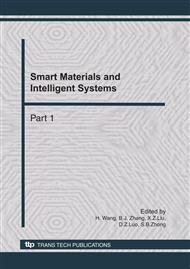p.873
p.879
p.884
p.888
p.894
p.899
p.905
p.910
p.915
A Large-Scale Device Collaboration Resource Selection Method with Multi-QoS Constraint Supported
Abstract:
With the rapid development of the “Internet of Things” and large-scale area management, device collaboration has developed to the stage of large-scale device collaboration. Aiming at the large-scale, dynamics and real-time of the large-scale device collaboration system, in order to ensure the performance of the large-scale device collaboration system, a Quality of Service(QoS) model of large-scale device collaboration is proposed, which contains device QoS model, composite QoS model and QoS relation model. Based on the model, an algorithm of the resource selection in large-scale device collaboration system is presented. Finally, the result of simulation experiments on the large-scale device collaboration prototype system shows that the method can satisfy the performance requirements of the large-scale device collaboration system.
Info:
Periodical:
Pages:
894-898
Citation:
Online since:
October 2010
Authors:
Price:
Сopyright:
© 2011 Trans Tech Publications Ltd. All Rights Reserved
Share:
Citation:


